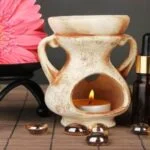Are you interested in learning how to become certified in aromatherapy? Aromatherapy is the practice of using natural plant extracts to promote health and well-being. In this article, we will explore the basics of aromatherapy and the importance of obtaining certification in this field.
Aromatherapy involves the use of essential oils and other aromatic compounds to improve a person’s physical, mental, and emotional well-being. Whether it’s through inhalation, topical application, or massage, aromatherapy has been used for centuries to address a wide range of health concerns. As the demand for holistic healing practices continues to grow, the need for certified professionals in aromatherapy has also increased.
While anyone can dabble in aromatherapy at home, obtaining certification demonstrates a level of expertise and commitment to the practice. Aromatherapy certification programs provide individuals with comprehensive knowledge about essential oils, their properties, safety guidelines, and practical applications. Certification not only enhances your skills but also opens up opportunities for career advancement and professional credibility.
In the following sections, we will discuss how you can research certification programs, choose the right program for you, meet the requirements for certification, understand the certification process, prepare for the exam, and maintain your certification through continuous education. Whether you’re an aspiring aromatherapist or already practicing in the field, this article will guide you on your journey to becoming certified in aromatherapy.
Importance of Certification in Aromatherapy
Becoming certified in aromatherapy is crucial for anyone looking to practice and specialize in this field. Certification not only demonstrates your knowledge and understanding of aromatherapy but also ensures that you are equipped with the necessary skills to safely and effectively use essential oils and aromatherapy practices with clients. Here are some reasons why certification in aromatherapy matters:
- Professional Credibility: Aromatherapy certification adds credibility to your practice and shows clients, employers, and colleagues that you have met certain standards of education and training.
- Ethical Considerations: Certification ensures that you are practicing within ethical guidelines and following industry best practices, which is essential when working with the well-being of others.
- Legal Requirements: In some regions, certification may be a legal requirement to practice as an aromatherapist or integrate aromatherapy into your existing healthcare or wellness practice.
When it comes to choosing the right aromatherapy certification program, it’s important to do thorough research to ensure that you are enrolling in a reputable and recognized program. Start by considering the following factors:
- Accreditation: Look for programs that are accredited by reputable organizations such as the National Association for Holistic Aromatherapy (NAHA) or Alliance of International Aromatherapists (AIA).
- Curriculum: Review the curriculum of each program to ensure that it covers a wide range of topics including safety, application methods, chemistry of essential oils, client interaction, and case studies.
- Instructors: Research the qualifications and experience of the instructors who will be leading the courses to ensure that they are knowledgeable and experienced in aromatherapy.
As you explore different certification programs, keep in mind that meeting the requirements for qualification may vary from one program to another. Some common prerequisites for enrolling in an aromatherapy certification program include a high school diploma or GED equivalent, as well as a strong interest in holistic health and wellness.
Ultimately, obtaining certification in aromatherapy requires dedication, commitment, and a genuine passion for holistic healing practices. By investing time and effort into pursuing certification through a reputable program, individuals can gain the knowledge and skills needed to thrive in this fulfilling field.
Researching Aromatherapy Certification Programs
When looking to become certified in aromatherapy, the first step is to research and find a reputable certification program. Whether you are looking to pursue a career in aromatherapy or simply want to deepen your knowledge and practice, finding the right program is crucial. Here are some tips on where to start when researching aromatherapy certification programs:
- Check Accreditation: Look for programs that are accredited by recognized organizations such as the National Association for Holistic Aromatherapy (NAHA) or Alliance of International Aromatherapists (AIA). Accredited programs ensure that you receive quality education and training.
- Read Reviews and Testimonials: Research online for reviews and testimonials from students who have completed the program. This will give you insight into the experiences of others and help you determine if the program aligns with your goals.
- Consult with Aromatherapists: Reach out to practicing aromatherapists and seek their recommendations for certification programs. They can provide valuable insights and guidance based on their own experiences.
- Consider Program Specialization: Some certification programs may specialize in certain aspects of aromatherapy, such as clinical application, holistic wellness, or specific techniques like essential oil blending. Consider your interests and career goals when researching programs.
Overall, researching aromatherapy certification programs is an important first step in pursuing certification. Taking the time to thoroughly explore your options will help ensure that you choose a program that best suits your needs and sets you on the path towards becoming a certified aromatherapist.
Choosing the Right Aromatherapy Certification Program
When it comes to becoming certified in aromatherapy, choosing the right certification program is crucial. With the growing popularity of aromatherapy, there are numerous programs available, making it essential to carefully consider several factors before making a decision.
Educational Requirements and Curriculum
One of the most important factors to consider when choosing an aromatherapy certification program is the educational requirements and curriculum. Look for programs that provide comprehensive education in essential oil therapy, anatomy and physiology, safety guidelines, and practical application of aromatherapy techniques. Ensure that the program meets the standards set by reputable organizations such as the National Association for Holistic Aromatherapy (NAHA) or Alliance of International Aromatherapists (AIA).
Accreditation and Recognition
It is vital to select an aromatherapy certification program that is accredited by a recognized organization within the field. Accreditation ensures that the program meets certain standards of quality and professionalism. Additionally, choose a program that is widely recognized within the industry, as this can impact your credibility and opportunities for employment or practice as a certified aromatherapist.
Practical Components and Hands-on Experience
Another key factor to consider is whether the certification program offers practical components and hands-on experience. Aromatherapy is a hands-on practice, and having opportunities to apply what you learn in a real-world setting can be invaluable. Look for programs that include practical training, case studies, and internships or practicums to gain hands-on experience in using essential oils for therapeutic purposes.
By considering these factors when choosing an aromatherapy certification program, aspiring aromatherapists can ensure they receive quality education and training necessary to become certified in this holistic practice. By carefully evaluating each program’s educational requirements, accreditation status, and practical components, individuals can make an informed decision on the best fit for their professional development in aromatherapy.
Meeting the Requirements
When pursuing certification in aromatherapy, it is important to understand the requirements that must be met in order to qualify for the certification process. Each certification program may have its own set of prerequisites, so it is crucial to carefully review and fulfill these requirements before proceeding with your application.
Educational Background and Training
One of the common requirements for aromatherapy certification is the completion of a certain number of training hours from an approved aromatherapy school or program. These training hours typically cover essential topics such as safety guidelines, essential oil application methods, anatomy and physiology, and client consultation techniques. Some programs may also require candidates to hold a minimum level of education, such as a high school diploma or equivalent.
Hands-on Experience
In addition to educational requirements, many certification programs also mandate that candidates gain practical experience in aromatherapy practice. This may involve completing a specific number of client sessions under the supervision of a qualified aromatherapist, or participating in hands-on workshops and practicums to demonstrate proficiency in essential oil blending, application techniques, and aromatherapy consultations.
Examination Prerequisites
Lastly, candidates seeking certification in aromatherapy will likely need to meet certain examination prerequisites set forth by the certifying organization. This could include completing prerequisite courses or workshops, obtaining CPR certification, or fulfilling a minimum number of supervised practice hours. It is important to carefully review the examination prerequisites for your desired certification program and ensure that you have met all necessary qualifications before registering for the exam.
By carefully researching and understanding the specific requirements for aromatherapy certification programs, aspiring practitioners can better prepare themselves for the certification process and increase their chances of successfully becoming certified in aromatherapy.
The Aromatherapy Certification Process
After completing your research on aromatherapy certification programs and choosing the right one for you, it’s time to delve into the certification process itself. While each program may have its own specific requirements and steps, there are some general things that you can expect when working towards becoming certified in aromatherapy.
First, be prepared to complete a comprehensive education and training program approved by the Alliance of International Aromatherapists (AIA) or the National Association for Holistic Aromatherapy (NAHA). This will typically include a specified number of hours in areas such as anatomy and physiology, essential oil safety, and blending techniques. You may also need to complete case studies or practical assessments to demonstrate your understanding and application of aromatherapy principles.
Next, once you have completed your education and training, you will likely need to pass a written exam to demonstrate your knowledge of aromatherapy concepts and practices. This exam may cover topics such as essential oil properties, therapeutic uses, contraindications, and professional ethics. Some certification programs also require a specific number of practice hours working with clients before you can sit for the exam.
Finally, after passing the exam and meeting all other program requirements, you will receive your official certification in aromatherapy. This achievement signifies that you have met the standards set forth by your chosen certifying organization and are equipped with the knowledge and skills necessary to practice aromatherapy safely and effectively.
| Certification Process | Expectations |
|---|---|
| Comprehensive education and training program completion | A specified number of hours in anatomy & physiology, essential oil safety, blending techniques etc. |
| Passing a written exam | Demonstrate knowledge of essential oil properties, therapeutic uses, contraindications etc. |
| Receiving official certification | Signifying meeting industry standards for safe & effective practice. |
Study Tips and Resources for Aromatherapy Certification Exam Prep
Studying for the aromatherapy certification exam can be a challenging yet rewarding experience. To prepare for the exam, it is important to establish a study routine and gather the necessary resources to help you succeed. One of the best study tips for aromatherapy certification exam prep is to create a study schedule that allows you to dedicate regular time to review course materials, practice aromatherapy techniques, and test your knowledge with sample questions.
In addition to creating a study schedule, it is essential to gather the right resources to aid in your exam preparation. This may include textbooks, online courses, flashcards, and practice exams. Many reputable aromatherapy certification programs offer study guides or recommended reading lists that can be invaluable in helping you focus your studies on the most relevant information for the exam.
Utilizing various study resources such as textbooks, online courses, and practice exams can provide different perspectives and approaches to learning aromatherapy. It is important to explore a variety of resources to find what works best for you.
Some individuals may benefit from hands-on practical experience with essential oils and aromatherapy techniques, while others may prefer visual aids or interactive online courses. By exploring different study resources, you can tailor your preparation to suit your learning style and maximize your chances of success on the certification exam.
Ultimately, succeeding in the aromatherapy certification exam requires dedication, organization, and access to quality study materials. By establishing a consistent study routine and leveraging a variety of helpful resources, you can feel confident and prepared when it comes time to sit for the aromatherapy certification exam.
Maintaining Aromatherapy Certification
Once you have become certified in aromatherapy, it is essential to focus on maintaining your certification through continuing education and professional development opportunities. This not only allows you to stay updated with the latest trends and research in aromatherapy but also demonstrates your commitment to the field.
Continuing education in aromatherapy can take many forms, including workshops, seminars, webinars, and online courses. These programs can provide you with additional knowledge and skills that can enhance your practice as an aromatherapist. Additionally, participating in these opportunities allows you to network with other professionals in the field and stay connected with the broader aromatherapy community.
One valuable resource for continuing education is membership in professional organizations dedicated to aromatherapy. These organizations often offer members access to exclusive content, conferences, and events that can contribute to their professional development. They may also provide mentoring programs or volunteer opportunities that allow you to give back to the community while furthering your own learning.
Finally, maintaining your certification in aromatherapy may also involve pursuing advanced certifications or specializations within the field. These could include areas such as clinical aromatherapy, aromatic medicine, or even product development. By continually expanding your expertise through advanced training and certification, you can position yourself as a leader in the field of aromatherapy.
| Professional Development Opportunities | Description |
|---|---|
| Continuing Education Programs | Workshops, seminars, webinars, and online courses providing additional knowledge and skills. |
| Professional Organizations | Membership grants access to exclusive content, conferences, events, mentoring programs. |
| Advanced Certifications | Pursue specializations within the field such as clinical aromatherapy or aromatic medicine. |
Conclusion
In conclusion, becoming certified in aromatherapy is a significant step for anyone looking to pursue a career in this field. By obtaining a certification, individuals can demonstrate their expertise and commitment to providing safe and effective aromatherapy practices. With the increasing demand for qualified professionals in the holistic health industry, having a recognized certification can open up numerous opportunities for employment and professional growth.
To become certified in aromatherapy, it is important to start by researching reputable certification programs that are recognized by industry organizations. Consider factors such as program accreditation, curriculum content, and instructor qualifications when choosing the right program for your needs. Additionally, meeting the requirements for certification may involve completing a certain number of training hours, hands-on experience, and passing an examination.
Once certified, maintaining your aromatherapy certification will likely require continuing education and participation in professional development activities. These efforts are essential for staying updated on industry trends, expanding your knowledge base, and enhancing your skills as an aromatherapist. Overall, taking the next steps towards becoming certified in aromatherapy involves dedication, hard work, and ongoing commitment to excellence in the field.
Frequently Asked Questions
What Qualifications Do You Need to Be an Aromatherapist?
To be an aromatherapist, qualifications typically include completing a certified aromatherapy program from a reputable institution, gaining practical experience, and passing a certification exam. It’s also beneficial to have a strong foundation in chemistry and biology.
How Long Does It Take to Become a Certified Aromatherapist?
The time it takes to become a certified aromatherapist can vary depending on the program and individual pace of study. Generally, it can take anywhere from several months to two years to complete the required training and education to become certified.
Is an Aromatherapy Certification Worth It?
Whether an aromatherapy certification is worth it depends on individual career goals and interests. For those passionate about holistic health and natural remedies, becoming a certified aromatherapist can lead to fulfilling work and the opportunity to help others improve their well-being.
However, it’s important to research the job market and demand for aromatherapists in your area before pursuing certification.

Are you looking for a natural way to improve your health and wellbeing?
If so, aromatherapy may be the answer for you.




